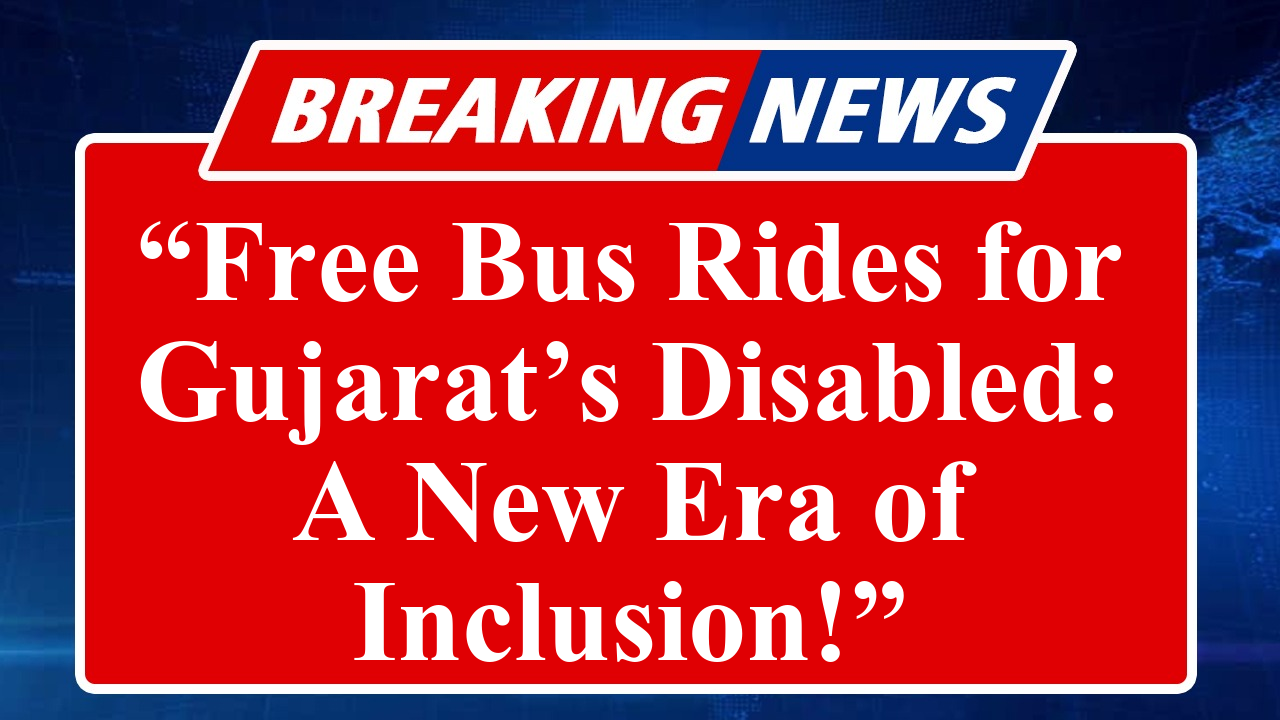Gujarat’s government has launched a groundbreaking scheme offering 100% free bus travel for disabled individuals and their assistants on state-run GSRTC buses. Announced on June 21, 2025, the initiative aims to enhance accessibility and empower over 1.5 million disabled citizens. The scheme covers various disabilities, ensuring inclusive mobility across the state.
Gujarat’s Bold Step Towards Inclusive Mobility
On June 21, 2025, the Gujarat government, through its Social Justice and Empowerment Department, rolled out a transformative initiative granting free travel on Gujarat State Road Transport Corporation (GSRTC) buses for individuals with disabilities and their assistants. This scheme, designed to foster inclusivity, targets over 1.5 million disabled persons in the state, addressing mobility barriers that have long restricted their access to education, employment, and social opportunities.
The program covers five categories of disabilities, including physical, visual, hearing, intellectual, and multiple disabilities, as defined under the Rights of Persons with Disabilities Act, 2016. Eligible individuals can avail of 100% fare exemptions on all GSRTC bus routes, including intra-city and inter-city services. Assistants accompanying disabled passengers also benefit from the fare waiver, ensuring support for those requiring aid during travel.
State officials highlighted that the scheme aligns with Gujarat’s commitment to the national “Accessible India” campaign. Chief Minister Bhupendra Patel emphasized the initiative’s role in empowering disabled citizens, stating, “Mobility is a fundamental right. This scheme ensures that no one is left behind due to physical or financial constraints.” The GSRTC, which operates over 8,000 buses and serves millions annually, has integrated the scheme into its ticketing system, with provisions for digital verification of disability certificates.
Data from the 2011 Census indicates that Gujarat has approximately 1.5 million persons with disabilities, though activists suggest the actual number may be higher due to underreporting. The scheme is expected to benefit urban and rural populations alike, particularly in remote areas where private transport options are limited or unaffordable. For instance, a visually impaired student from Surat can now travel to Ahmedabad for educational purposes without incurring costs, a move hailed by disability rights groups.
The initiative has garnered praise on social media platforms, with posts on X reflecting positive sentiment. Users have lauded the scheme as a “game-changer” for disabled communities, though some raised concerns about implementation challenges, such as ensuring awareness and accessibility at rural bus depots. The government has responded by launching awareness campaigns through local NGOs and district administrations to ensure widespread adoption.
To facilitate seamless access, GSRTC has introduced a streamlined process for beneficiaries to register their disability certificates via an online portal or at designated bus depots. The scheme also includes provisions for periodic reviews to assess its impact and address any operational bottlenecks. Experts estimate that the initiative could set a precedent for other states, potentially reshaping public transport policies nationwide.
The financial implications of the scheme remain under scrutiny, with the state allocating an initial budget of ₹200 crore annually to cover fare losses. Economists suggest that while the cost is significant, the social and economic benefits—such as increased workforce participation among disabled individuals—could offset the expenditure in the long term. The scheme also complements existing state programs, like subsidized assistive devices and skill development initiatives for the disabled.
Disability rights advocates, while optimistic, have called for robust monitoring to prevent misuse and ensure that benefits reach the intended recipients. “This is a progressive step, but its success depends on ground-level execution,” said Priya Shah, a disability rights activist based in Ahmedabad. She urged the government to train GSRTC staff to assist disabled passengers effectively and ensure buses are equipped with accessibility features like ramps and priority seating.
As Gujarat takes this bold step, the scheme stands as a testament to the state’s commitment to inclusivity, potentially inspiring similar measures across India. The initiative not only enhances mobility but also reinforces the dignity and independence of disabled individuals, paving the way for a more equitable society.
Disclaimer: This article is based on information from official announcements by the Gujarat government, GSRTC statements, and posts found on X as of July 6, 2025. Data and sentiments expressed are subject to change, and readers are advised to verify details with official sources for accuracy.

